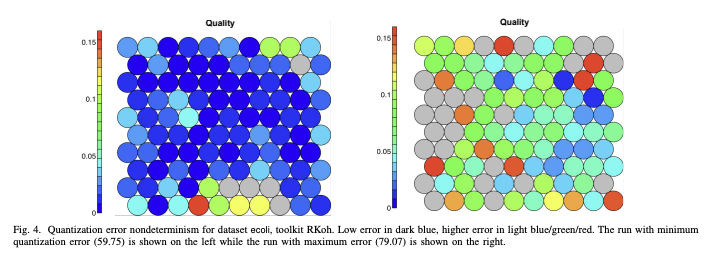Quantifying Nondeterminism in SOM models
SOM (self-organizing maps) project in collaboration with Professor Iulian Neamtiu.
Research Contributions
Title: Quantifying Nondeterminism and Inconsistency in Self-organizing Map Implementations
Published In: AITEST Conference 2021
Collaborators: Sydur Rahaman, Raina Samuel, Iulian Neamtiu
Overview
I contributed to groundbreaking research analyzing the reliability of Self-Organizing Maps (SOMs), a neural network-based technique for clustering and dimensionality reduction. Our work addressed critical gaps in understanding nondeterminism (variability in outcomes across repeated runs) and inconsistency (differences in results across implementations), particularly when applied to medical and other critical datasets.
Key Contributions
- Toolkit Analysis: Assisted in benchmarking SOM implementations across four popular toolkits (MiniSom, RKoh, MATLAB, and TensorFlow SOM) using 381 datasets, including health and bioinformatics data.
- Statistical Validation: Helped design statistical tests to identify and quantify nondeterminism and inconsistency using internal and external metrics such as clustering accuracy, trustworthiness, and distortion.
- Critical Insights: Found significant variability in SOM reliability, highlighting the importance of multiple toolkit evaluations for high-stakes applications.
- Technical Support: Supported the development and debugging of TensorFlow SOM implementations to ensure robust comparisons.


Impact
This research exposed reliability challenges in SOM usage, prompting the need for rigorous testing and validation. It provides actionable insights for practitioners in fields like healthcare, where consistent and reliable machine learning outcomes are essential.
External Links
- Our Research Paper - Read the full publication “Quantifying Nondeterminism and Inconsistency in Self-Organizing Map Implementations.”
- Making Artificial Intelligence More Reliable - Read the article about the impact our research team has had on the AI community.
Acknowledgments
The project was supported by the National Science Foundation under Grant No. CCF-2007730.